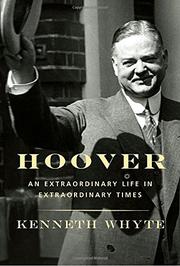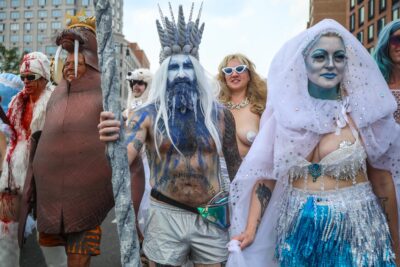Interview with 2018 NBCC Biography Award Finalist Kenneth Whyte
For the past four years, the National Book Critics Circle has partnered with The New School’s MFA Creative Writing program, allowing the students to interview each of the NBCC Awards Finalists. In addition to building excitement for the Awards Finalist Reading and Ceremony held at the New School March 14th-15th, these interviews have built an intergenerational bridge between the writers of today and tomorrow.
This year, as part of the ongoing collaboration, and in support of the NBCC’s conversation about reading, criticism, and literature that extends from the local to the national, Brooklyn Magazine will publish and promote the interviews between NBCC Finalists and the current students of The New School.


In Hoover: An Extraordinary Life in Extraordinary Times (A.A. Knopf), Kenneth Whyte delivers as intimate a portrait of the 31st U.S. President as exists in the genre. Whyte presents the full life of a man for whom the presidency was only one of many chapters, including his difficult childhood, his rough-neck years as a engineer and mining executive in Australia and China, and his titanic humanitarian efforts during and after the First World War. The result is a deeply sympathetic portrait of one of America’s most misunderstood presidents. I spoke with Whyte to discuss his process and his subject.
This book is incredibly well-sourced, including over sixty-five pages of citations. How long was your research period?
About seven or eight years. I did it all chronologically, because I didn’t want to get too far ahead of the story looking back at his career with the knowledge that he had: (A) become president and; (B) that his presidency had been difficult. I wanted to experience his life as he lived it, from the beginning through the end, without a lot of preconceived ideas. So, I would go back and forth, from Toronto to [The Herbert Hoover Presidential Library in] West Branch, Iowa, every six months or a year, to sort of pick up the next segment of his life and start anew.
Did that lead to specific storylines emerging that maybe you wouldn’t have found with a different approach?
Absolutely. Every piece of it was different because of that approach. I think there’s a tendency in presidential biography to be respectful and ‘presidential’ in the presentation of the subject.
So for instance, in Hoover’s boyhood, there were some very difficult periods. After he was orphaned, he was a neglected boy living with an uncle in small-town Oregon and having a very difficult time of it. I think this has been systemically underplayed by all the other biographers that have approached Hoover, because it doesn’t really fit the picture of presidential character. His business career as well: Hoover was much more ruthless and dastardly in his business activity than I had been led to expect by other biographical material. When you’re closing negotiations with other parties by waving a gun around and making threats, it doesn’t really fit with preconceived notions of how a president behaves.
Some of those [notions] might have changed a bit in the last year but generally speaking, that’s not how we see our presidents.
Do you think that’s the main reason people have this mischaracterized impression of Hoover as a failure? As I was reading, it felt to me like the biggest reason was FDR’s characterization of Hoover in the 1932 election.
It’s never one thing. Certainly FDR colored Hoover a certain way and was very effective at it. Hoover in his own speeches tended to idealize his background and make himself look like an “All-American Boy.” He thought that would sell better to the electorate. So he’s kind of the author of his own cover up, as well as his biographers.
They put in tangents, but mostly to try and make him look good, or look presidential, and that tended to highlight the more salubrious aspects of his career than the troubling ones.
Many of the details Hoover’s personal life came through secondhand recollections and letters from people around him. Is there a reason you favor these adjacent accounts over, say, the George Nash biography of Hoover?
George Nash wrote three volumes on Hoover’s career up to the age of 40. I think Nash has done a tremendous job of researching and understanding Hoover—and I learned a lot from him.
That said, George’s biographical work was part of an official biography commissioned by the Hoover library, very much interested in explaining and understanding Hoover, the president. I was more interested in Hoover, the man. I felt a need to get a sense of what his life was like as he lived it. He wasn’t an introspective person; he had no diaries; he wasn’t a letter writer, and he wasn’t inclined to sort of pick his own Boswell to tell a story. He just wasn’t tuned that way.
But from a very early age, he was surrounded by people who were really interested in him as a personality. Who saw something unique and great about him, and a surprising number of [these people] kept very close records in their own diaries, notes, letters, about his comings and goings, thoughts and decisions. They allowed me to get a lot closer to Hoover than frankly I expected I would at the outset.
We know from your last project, The Uncrowned King: The Sensational Rise of William Randolph Hearst that you’re interested in early 20th century America. Was there something specific that drew you to Hoover besides your interest in the era?
Well, I don’t see much use in writing a book unless you’ve got something new to say, or bringing someone to life that isn’t known. I was looking for a subject and reading a lot about the First World War, and Hoover kept popping up as this incredibly effective competent character—”a man of great capacities”—who was getting things done when no one else could get anything done, during the war and in the immediate aftermath. And the picture of him was so at odds with anything I’d read about Hoover that I got curious—”Which was the real Hoover?”
The fact that he had so little written about him, yet had such a critical role in American history, it was like this big gaping hole in the middle of America’s story. For me, that’s like the best thing you can find as a writer: some interesting, complicated subject, that nobody else has treated, that occurs at a very pivotal moment of history. So I felt like stumbled on a great opportunity.
It feels to me like this book is meant to be redemptive for Hoover, or at least a correction of the record. How conscious were you of creating that narrative. Was it something you consciously did in your writing, or did you try and let his record speak for itself?
In my book about Hearst, I spent too much time arguing with other people’s estimations of [Hearst]. If I had to go back and do it again, I would just tell the story and let it speak for itself, rather than arguing with other writers and historians. So I went deliberately into Hoover determined not to think about [what anyone else] had said about him, and just accept, good or bad, what I found.
Hoover’s legacy is inexorably tied to the question of who’s to blame for the Great Depression. You don’t shy away from the details when this subject comes up. There are times where you get very specific with statistics about economic policies and performance. How conscious were you of balancing that level of detail and keeping the book from delving into policy wonkiness?
I was very concerned about that, because this was not a book about political science; it’s a biography. At the same time, he was a politician, and that was his business—so you have to understand what he was doing and why he was doing it in order to understand the man. I tried to collect what, to my mind, were the most essential and illustrative examples of Hoover’s performance.
I spend quite a bit of time on his efforts to fight the depression because I think that’s where he did a lot of his best work. You could argue that none of them were successful in that the economy never bounced back, but he went farther than any president had gone before him. When you admit how far Hoover went during his term, a lot of what Roosevelt does as his successor seems less novel, and the break between the republican era of the ’20s and the New Deal era of Roosevelt is then not anywhere near as sharp as it’s often portrayed.
First Hearst, then Hoover, can we assume [Howard] Hughes is next?
No, in fact, I’ve moved up a half a century, writing about what happened to American business in the ’60s and the ’70s. There was a big shift with America from that Calvin Coolidge mode, “the business of America is business,” to becoming much more concerned about the consequences of economic growth and business activities. So I’m writing about that shift, using the history of General Motors.
You might also like 


























